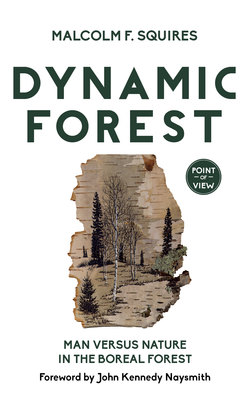Читать книгу Dynamic Forest - Malcolm F. Squires - Страница 7
На сайте Литреса книга снята с продажи.
Foreword
ОглавлениеThis book, Dynamic Forest, is the product of an experienced forester’s perspective on a significant area of Canada’s vast boreal forest, which in turn is typical of boreal forests indigenous to northern regions around the world.
The deep understanding that Mac Squires acquired of the boreal forest is the product of more than six decades of close association with it. An association that began as a boy growing up in a forest community in Newfoundland, where he spent much of his time roaming the forest and, as he says, “observing it going about its business.” With that background, it was natural that he would choose to study forest science at university. A choice which in turn led to a very successful career as a professional forester, one characterized by his first-hand understanding of the boreal forest community.
The business Mac refers to stems largely from the connectedness of trees, water, air, and soil. A recent study of Canada’s boreal forest suggests that the collective value of that connectedness, when quantified in terms of carbon storage, flood control, and water filtering, is in the order of $700 billion annually. By comparison, the average annual value of renewable and non-renewable products from Canada’s boreal forest that flow through the market place is roughly 10 percent of that figure.
Going about its business, to be sure, and that study pertains only to Canada and does not include any of the boreal forests elsewhere in the world. Twenty-first century forests, considered on a global scale, have become invaluable.
A feature of Mac Squires’ career in recent years has been his ability and willingness to communicate with the public on a broad spectrum of forestry topics, ranging from understanding how the forest works, to forest management strategies and initiatives directed at ensuring healthy forests in the future. An example of his success at reaching out to the larger community is the series of some sixty articles that he wrote over a three-year period for publication in a northwestern Ontario daily newspaper.
The considerable response that the published columns elicited ranged from appreciation for improving the readers’ understanding of the natural forces inherent in the forest to thanks for helping readers gain an informed view regarding the effects of human intervention and subsequent efforts to maintain productive forest land. Not all readers supported the nature and extent of the latter. In Mac’s view, that was fine. He felt that the purpose of the articles was to facilitate productive discussion based on correct information. That was happening.
One concern expressed by many who read Mac’s columns was that the value of these newspaper articles was being limited as they were being read by a relatively small number of readers. It was frequently suggested that if they were published in book form, the potential for reaching a substantial number of readers could be attained. The book was seen as a step toward increasing society’s awareness of the importance of the globe’s forests. We are fortunate indeed that Dundurn Press has done just that.
The philosopher and poet George Santayana once said, “The earth makes music for those who listen.” Now sit back and enjoy learning about some of the music Mac has heard during a lifetime of listening.
John Naysmith R.P.F. (Ret’d) is a Lakehead University Fellow and recipient of a Charles Bullard Fellowship from Harvard. In his five-decade-long career, he served as a company logging superintendent in northern Ontario; chief of the Water, Forest and Land Division, Yukon and NWT; founding chair of Ontario’s Forestry Futures Trust Committee; founding dean of Lakehead University’s Faculty of Forestry; and as Canada’s representative on the United Nations Advisory Committee on Forestry Education.
